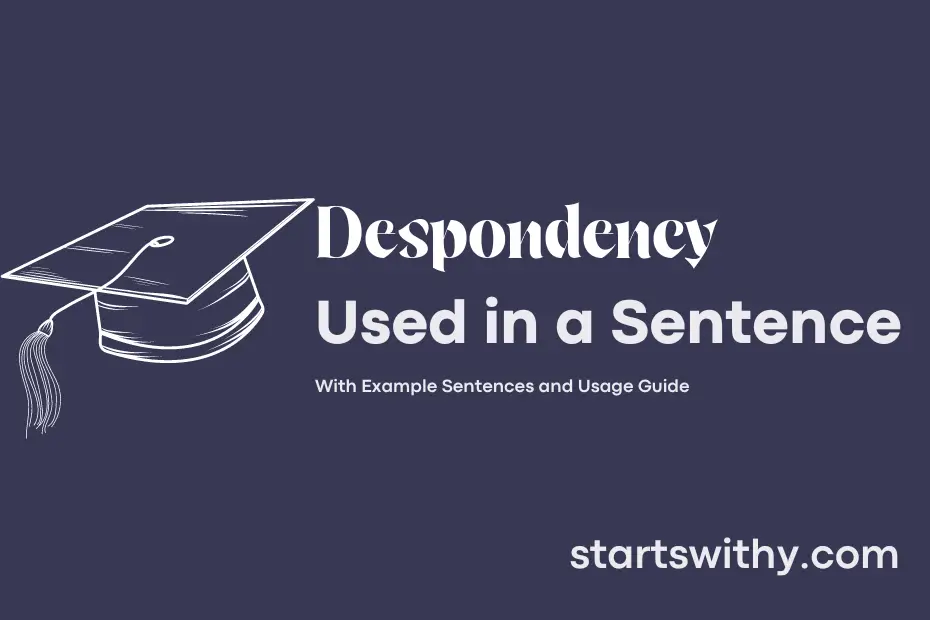Have you ever experienced a moment of deep sorrow or hopelessness? This emotional state, known as despondency, is characterized by a feeling of extreme discouragement and despair.
Despondency can be triggered by various factors such as failure, loss, or prolonged stress. While it is a normal human emotion, prolonged despondency can have negative effects on mental health and overall well-being.
7 Examples Of Despondency Used In a Sentence For Kids
- It’s okay to feel sad sometimes, but remember despondency doesn’t last forever.
- When you feel down, talking to a friend can help chase away despondency.
- Drawing colorful pictures can lift your mood and make you forget about despondency.
- Playing outside in the sunshine can help chase away feelings of despondency.
- Remember to take deep breaths when you’re feeling despondency creeping in.
- Singing your favorite song can make you feel better when you’re dealing with despondency.
- A big hug from someone you love can make despondency disappear.
14 Sentences with Despondency Examples
- Despondency set in as the deadline for the project drew closer and I hadn’t even started yet.
- After receiving a low grade on my exam, despondency clouded my thoughts, making it difficult to focus on studying for the next one.
- The constant pressure to excel in academics led to a feeling of despondency among many of my peers.
- My friend’s constant comparison to others caused her to fall into a pit of despondency about her own achievements.
- The lack of job opportunities on campus only added to the sense of despondency among graduating students.
- Despondency crept in as I scrolled through social media, seeing posts of my friends having fun while I was stuck studying.
- The overwhelming workload led to a feeling of despondency as I struggled to keep up with assignments and deadlines.
- Not being able to secure an internship over the summer filled me with a sense of despondency about my future career prospects.
- The pressure to maintain a high GPA caused many students to experience despondency when they fell short of their own expectations.
- The feeling of despondency grew as the campus started to empty out for summer break, leaving me with a sense of loneliness.
- A series of rejections from job interviews left me in a state of despondency as I questioned my qualifications and abilities.
- The constant comparison to other students’ achievements only heightened my sense of despondency about my own progress.
- The fear of not meeting societal expectations often leads college students in India to experience despondency about their future.
- The isolation of virtual learning during the pandemic contributed to a pervasive sense of despondency among college students.
How To Use Despondency in Sentences?
Despondency is a noun that refers to a state of feeling hopeless or discouraged. Here’s a guide on how to use it in a sentence for beginners:
-
When describing emotions: “After failing the exam, Sarah was overwhelmed with a sense of despondency.”
-
In personal reflection: “During moments of despondency, it’s important to remember that things will eventually get better.”
-
While discussing mental health: “The therapist helped Paul work through his feelings of despondency by providing strategies for coping with stress.”
-
When talking about a character in a book or movie: “The protagonist’s journey was filled with moments of despondency as he faced numerous challenges.”
-
In a general statement: “It’s normal to experience bouts of despondency during difficult times, but reaching out for support can make a difference.”
Remember, despondency is a strong word that conveys deep feelings of sadness and hopelessness. It is essential to use it in situations where the emotion being described is profound and intense. By incorporating this word into your vocabulary, you can effectively express feelings of despair or discouragement.
Conclusion
In conclusion, the sentences with despondency convey a deep sense of hopelessness and despair. These sentences reflect a state of low spirits, dejection, and gloom. The use of despondency in writing can evoke a powerful emotional response from readers, highlighting the gravity of the situation being described and creating a poignant atmosphere.
By incorporating sentences with despondency into their work, writers can effectively communicate complex feelings of sadness and disillusionment. These sentences can help to establish a somber tone and convey the depth of despair experienced by characters or in real-life situations. Overall, the use of despondency in sentences adds depth and emotional richness to writing, making it a powerful tool for evoking empathy and understanding.



